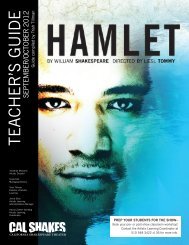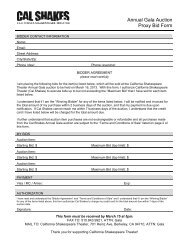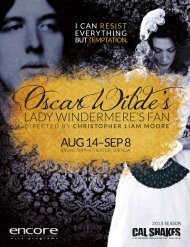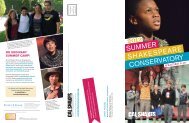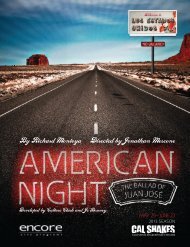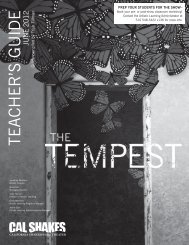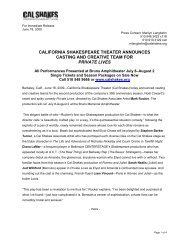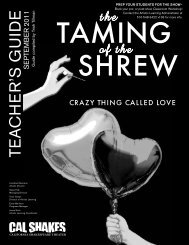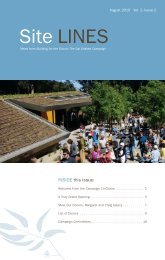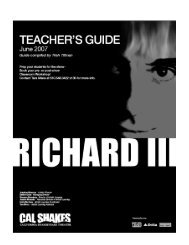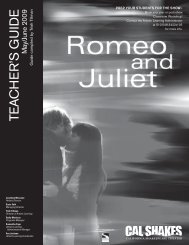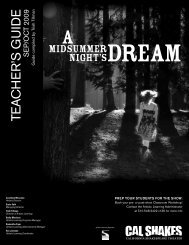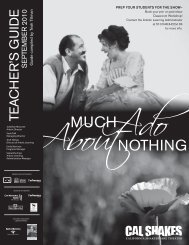Twelfth Night teacher's guide - California Shakespeare Theater
Twelfth Night teacher's guide - California Shakespeare Theater
Twelfth Night teacher's guide - California Shakespeare Theater
Create successful ePaper yourself
Turn your PDF publications into a flip-book with our unique Google optimized e-Paper software.
Character Backstory:<br />
What Makes a Personality?<br />
Overview: Write the backstory for one of the minor characters in <strong>Twelfth</strong> <strong>Night</strong>: Malvolio, Sir Toby Belch, Maria, or Feste.<br />
A “backstory” is the personal history of a character that is not described in the actual play or story. In other words, it is what<br />
happens to the character before the play starts.<br />
Grade: 4-12<br />
Goal: To use contextual clues to create an imaginative experience of a minor character.<br />
State Standards: English Writing Applications §2; <strong>Theater</strong> Arts §1 Identify character’s objective and motivations to<br />
explain the character’s behavior.<br />
Outcomes: Students will research the play for clues to the characters, and fully describe an imagined life previous to the<br />
play’s beginning that justifies the way the character acts in the play.<br />
Activity: Explain to the students that the interior life of the character is something an actor must be able to imagine as<br />
they start to understand how to play that character. The life of a minor character has been a popular literary and theatrical<br />
exercise and can illuminate the main story even more brightly. For instance, Wicked is a very popular book-turned-Broadway<br />
musical that explores the backstory and unseen lives of the Witches of Oz.<br />
Have the students write a backstory of Malvolio, Sir Toby, Maria, Sir Andrew, or Feste.<br />
The backstory should:<br />
• Be creative.<br />
• Describe the setting (when and where the backstory takes place).<br />
• Describe the character as s/he was early in life—personality, looks, situation, etc. with vivid details.<br />
• Use action words, descriptive words, dialogue, and images.<br />
• Be based on clues from the main story when possible.<br />
• Describe a problem that the character faces and why it is a problem (I’m tired of being treated like a lowly servant, maybe if<br />
I dress up in a fancy way, I’ll be treated better. I know I drink too much, but I don’t have a job and I’m bored, etc.).<br />
• Describe specifically why s/he chooses to do those things (for example, personal satisfaction, revenge, habit, being forced<br />
to do them by someone else, etc.).<br />
• Describe how the character feels about doing what s/he does in the play.<br />
When the students are finished, they will now read the backstories to other people in a group. Students will read their own<br />
backstories.<br />
Then each group should pick one of those stories to present to classmates in an artistic way. They can choose how to<br />
present it. Possibilities include: a rap, comic strip drawings, tableau, puppet show, etc.<br />
Coaching:<br />
Tell the students that this requires them to use their imagination! Think of what the character does in the play and imagine<br />
reasons why the character ends up doing what he/she does.<br />
Remember, there is no “right” answer to an open-ended exercise, as long as they can justify their choices using the text.<br />
This exercise is specifically designed to explore the life of minor characters in the play—characters that are often overlooked,<br />
but can yield fascinating discoveries. Actors, even when playing a smaller role, must do this same kind of research to be<br />
able to make that character believable on stage.<br />
Reflection:<br />
Why did you decide on the specifics that you did for your character? For example, why did you choose a particular setting<br />
for that character’s childhood?<br />
Does the play provide enough clues to spark your imagination? Why or why not?<br />
What did you find (in your backstory or someone’s from your group) that was particularly interesting?<br />
How hard was it to imagine beyond the story?<br />
PAGE 35



